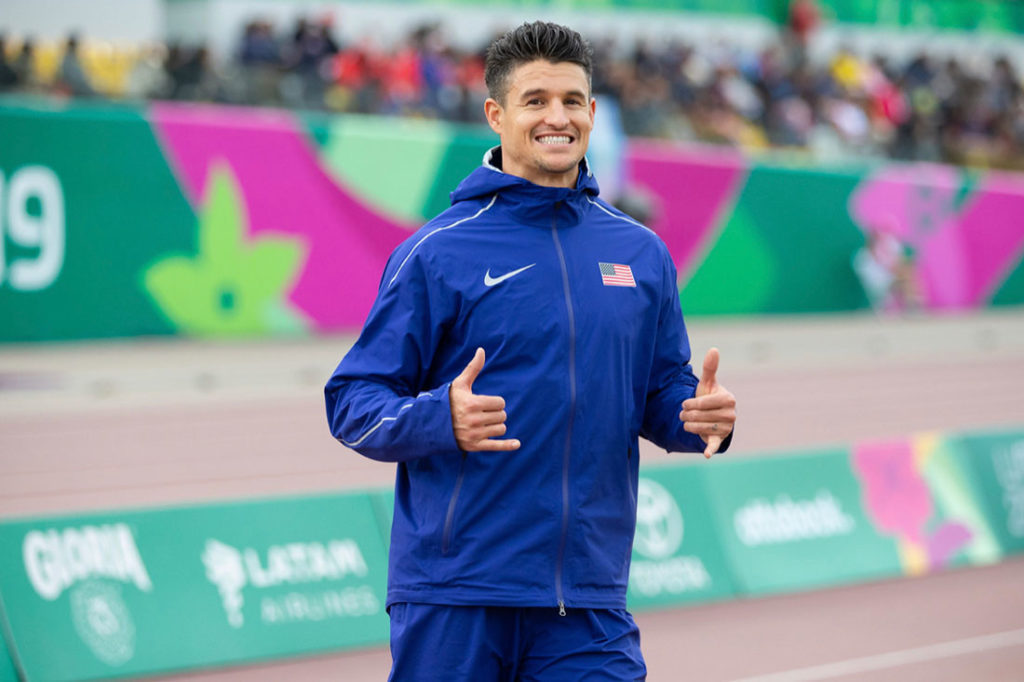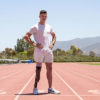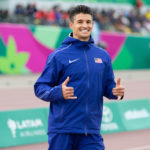In early July 2021, I received the most exciting news of my life: I had qualified for the 2021 Paralympic Games in Tokyo.
To say that I’m proud to make the team—and to be representing Team USA in long jump—would be an understatement. Making this team is a goal for years in the making. It’s the result of hard work, overcoming numerous challenges and finding strength I never knew I had.
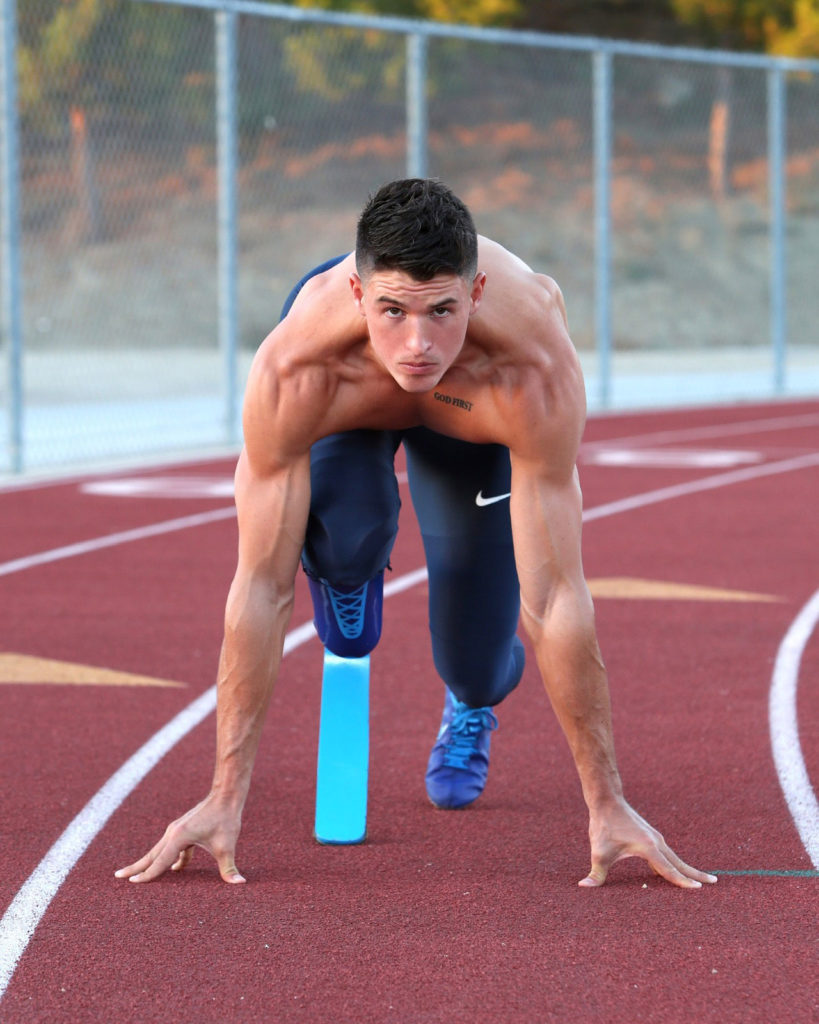
During 2005 spring break, when I was a 14-year-old freshman at Jserra Catholic High School in Orange County, California, my best friend Scott and I were riding his dirt bike from my house to his. When we arrived at his street, Paseo Christina (the only one without a stop sign), Scott and I looked both ways and saw cars coming from a safe distance to our left. We crossed, and right when we got to the next lane after the intersection, I saw a flash of white. It was a white BMW 3 Series. A 16-year-old girl was driving. She didn’t see us crossing, and we didn’t see her. Shortly after, I woke up on the floor thinking I’d just had a crazy dream that a car had hit Scott and me. But as I regained consciousness, I opened my eyes and saw Scott screaming. His face was bloody. I lifted my foot and noticed my shoe was gone and my foot was swollen beneath my sock. Gently, I put my foot back on the ground and felt an uncomfortable yet numb feeling. I thought, this is my first broken bone; this is what it must feel like. My helmet was gone and my elbows were bloody.
I reached into my pocket and grabbed my phone to call my dad. I told him, “Scott and I just got hit by a car. Come to Scott’s house.” He was in shock and I told him again, “Come to Scott’s.” It felt like a week passed before I could fully understand what was going on in the hospital. I spent about two weeks in the ICU.
After a few days, I was in the hospital loving life—that is, until the pain meds wore off and the throbbing pain in my foot came back. I was thinking about what color cast I would get and how everyone would be able to sign it when I got back to school. Four surgeries later, the doctor came to my room to talk to me and my mom. My toes were starting to turn black and I was losing movement and feeling in them.
“Trenten, I am going to do a quick test,” the doctor said. “I am going to run this pencil along the bottom of your foot and I want you to tell me if you can feel it.”
“OK,” I said.
He ran the pencil along the bottom of my foot and asked me if I felt anything. I didn’t. He then showed me a scalpel.
“Trenten, this is what I used on the bottom of your foot.”
The doctor took my mom outside the room to talk and I could see through the door that my mom was crying. I then realized what everyone else had already known. I was going to lose my foot.
I started crying. Worry and uncertainty washed over me.
- Who would I be?
- Would I ever be able to play sports again?
- Are my dreams of becoming a professional athlete gone?
- What girl would want to date a guy with one foot?
As I was crying, Scott’s mom came in and started praying over me. I felt a sense of peace come over me. I heard a voice that said, “I have plans for you.” I stopped crying. At a time when my doctor was uncertain, my family was uncertain and I was uncertain about what my life would be like after this, all I needed was hope.
Later that day, I told the doctor we could go through with the operation. My foot was amputated shortly after. I then experienced a new pain known as phantom pain. It was excruciating at times, but the love and support I experienced during my stay in the hospital was a gift from God.
While I recovered from my surgery, a Marine named David Nicks came to speak with me. He’s a big guy with a prosthetic. He told me he lost his foot in a motorcycle accident and that he re-enlisted in the U.S. Marine Corps after his amputation. I asked him about things that made me feel insecure, about life as an amputee. I asked about riding motorcycles, about playing sports—and most importantly at the time—about girls. He told me he ran on the beach with his platoon every morning and said I could do the same with sports. I asked him if he had a girlfriend and he said, “this is my girlfriend,” pointing to a woman standing next to him. I heard all I needed to hear. I believe he was sent from God to help inspire me and answer some of my questions.
When I left the hospital, I had one thing on my mind: Getting a prosthetic and getting back into sports. I had played sports all my life. I was on the junior varsity soccer team and was training for varsity. Outside of soccer season, I was racing motor-cross and joined the volleyball team. As a young boy, I dreamed of becoming a professional athlete and played every sport to challenge myself.
Three months after leaving the hospital, once the swelling in my limb had gone down, I was fitted for my first prosthetic and started walking immediately. No more crutches, walkers or wheelchairs—I had my foot back. I started attending physical therapy and progressing rapidly. Once I progressed to being able to jog again, I told my mom I didn’t want to go back to physical therapy. Instead, I started playing sports with my friends again and started regaining my confidence.
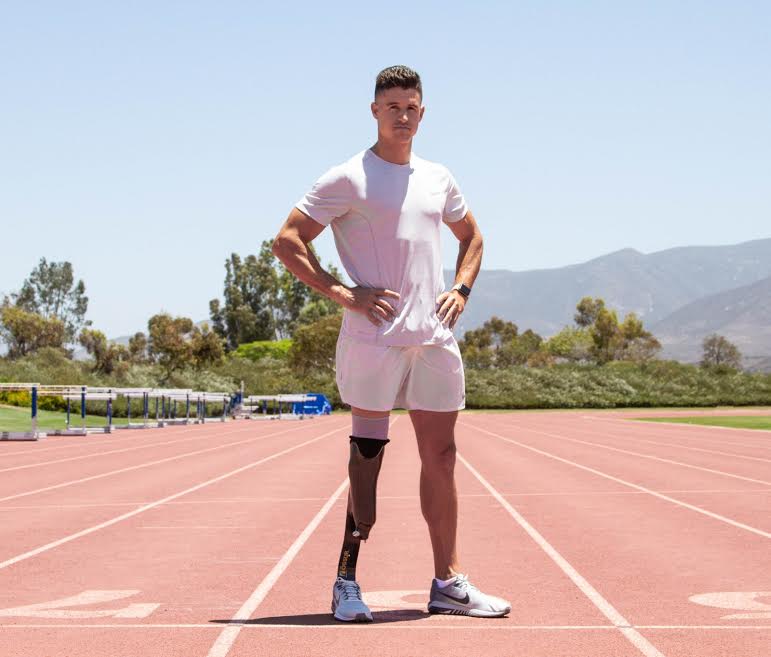
I went back to school at Jserra and started playing volleyball again. I wanted to join the track team, but I felt I wouldn’t be as fast with one leg, so I didn’t try out. I finished my sophomore year at Jserra, but I was being bullied because of my disability and was having a hard time coping. My best friends went to a public school nearby, Capo Valley High School, so I asked my parents to transfer. I had a blast at Capo Valley High School—I was surrounded by pretty girls, my best friends and plenty of new friends. Girls showed me attention; people invited me to parties; I started wrestling on the school’s team. I felt like I was beginning to find myself again. Still, I battled insecurities and wore jeans every day for the remainder of high school.
After graduating high school in 2008, I attended Saddleback Community College. I told myself this would be a new start, and that I had to get comfortable being me. If people don’t like me because of my prosthetic, that is their problem, not mine. My friends and I started going to the Saddleback Church’s Thursday night young adults service. I found meaning in my life, but not direction.
One day, my prosthetist, Gary Yamamoto, told me about a running clinic in Irvine, California, and told me I should attend. I showed up at the clinic hosted by Challenged Athletes Foundation and Ossur Prosthetics Company. They placed me in a group with people learning how to jog. I told the instructors I didn’t want to be in that group; I wanted to be in the group with the advanced people. Joaquim Cruz, Brazilian Olympian gold medalist in the 800-meter run, came up to me and introduced himself as the Paralympic track and field coach. I followed him to the group of higher-functioning people with disabilities and met two Paralympic athletes: Brian Frasure, a U.S. Paralympian, and Oscar Pistorius, South African Paralympian. I did the drills with them and was having fun. At the end of the event, Brian asked if I had considered doing Paralympic track and field.
“I don’t know what Paralympics is,” I responded. He told me I’d be able to get paid to compete and travel the world. I thought to myself, this is too good to be true. I would go on attend a Paralympic development camp the following month. When I arrived at the Olympic training center, I once again heard what God told me in the hospital: “I have plans for you.” I felt chills. I knew this was where I belonged. That night, I was so pumped I put my headphones on and jogged around the center feeling like Rocky Balboa.
Now I had something to pursue. I had purpose. The 2010 Paralympic Nationals were in just a few months and I wanted to make the USA team for World Championships. I found a coach and trained as hard as I could. I traveled to Florida for my first Paralympic Nationals. I was excited. But my time wasn’t fast enough to make the finals, and the competition was faster than I expected. But I wouldn’t let that stop me. I kept training. After a few years at community college, I transferred to the University of Colorado Boulder. While at Boulder, I became friends with the head sports scientist. He asked me if I’d been training with the team at school. I wanted to, but they weren’t returning my calls. The following week, he came to me and said, “Trenten, I met with the coach and I’m sorry to say this, but they think you’re a liability.”
I was heartbroken. I asked God, “Why?” I felt like my dreams might be taken away. I didn’t know what to do. I had all these emotions and aggression building. It was nearly dark when I sprinted the 100 meter all-out. I ran. I cried. I stopped to talk to God. Then I ran more. I let all my emotions seep out into my sprints. Screw this, I thought. I am going to prove them wrong and train by myself. So I started training more aggressively three times a day on my own and started looking at other schools with good track programs.
As I was working out, I started listening to Christian hip-hop, and a commercial kept coming up. “Azusa Pacific University, the No. 1 Christian College.” I didn’t think anything of it until I kept seeing it pop up in my life. I looked up Azusa Pacific’s track and field team and noticed they were transitioning in divisions and I would be eligible for the team. I emailed the head coach, Kevin Reid, letting him know my goals and dreams and that I was interested in transferring from Boulder. He emailed me back within just a few days. They wanted me. I finished the semester at Boulder, moved back to California, and started training for the 2021 US Paralympic trials. I qualified for long jump and the 100 meters.
The week leading up to the Paralympic trials, I was working out hard in Long Beach. I flew to Indianapolis and competed. I was pushing as hard as I could to jump far, but it wasn’t enough. During team announcements, I remember all the names being called and mine was yet to be heard. I was devastated. I was sad and angry, but I knew that I was going back to a fresh start at a new school and I still had my dreams to chase.
I attended Azusa Pacific University and found purpose at this school. I was the only amputee in athletics and one of the few in the school with a disability. I loved being on the team. I became nominated captain of the team, not because of my performances but because of my work ethic and determination. We would pray together; we had classes where I would learn more about faith. I was being challenged in my major of exercise science and could directly apply my knowledge to training as an athlete.
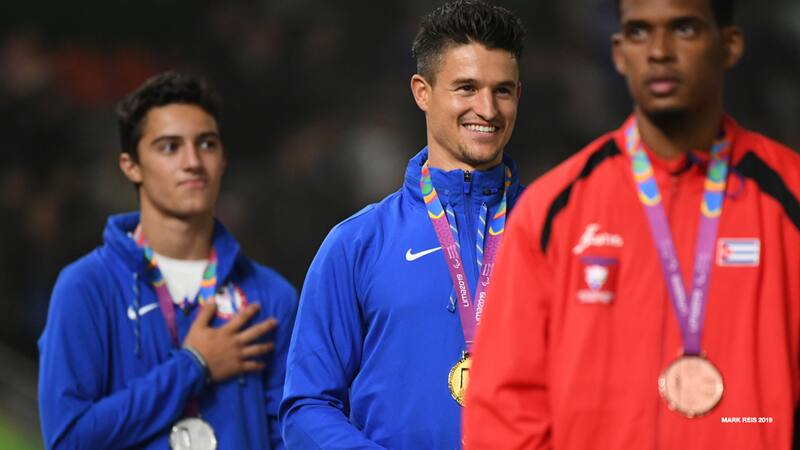
In 2016, following years of injuries, successes and comebacks, I headed to Rio for the Paralympics. When I arrived there, I had this focus about me as I walked into the stadium—a calm but controlled feeling. I jumped and ended up breaking the American record twice jumping 22 feet, 5.25 inches, but fell just short of the podium and placed fourth.
I kept working hard and in 2021, I broke the American record again, jumping 7.75 meters and moving up to second in the world rankings. My experience has shown me that through hard work, determination and faith, anything is possible. That’s the mindset I plan to take to Tokyo when I head to the Paralympic Games to represent Team USA this summer.
Photos courtesy of Trenten Merrill



